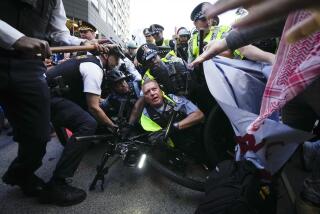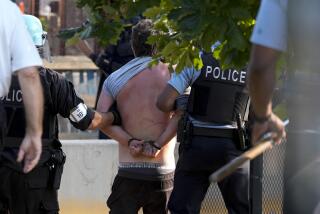Chicago’s Lessons Remain Unlearned
- Share via
Los Angeles 2000 is on the verge of becoming Chicago 1968. If the police continue to engage in the provocative tactics and indiscriminate behavior they displayed on the first day of the Democratic National Convention, the LAPD’s own prophesy of chaos on the streets of L.A. will surely come to pass.
What mainstream media are now calling the “melee” outside of the Staples Center Monday night after the Rage Against the Machine concert was a show of excessive force by police against an overwhelmingly peaceful gathering of protesters.
A handful of individuals did engage in unlawful behavior, including rock throwing, which merited targeted police intervention. Yet instead of arresting the lawbreakers, police used their behavior as a pretext for dispersing all of those gathered, subjecting many who were peacefully standing by to unwarranted abuse--baton blows, rubber bullets and tear gas. Police did not give clear instructions as to how to leave the area, and confused concert attendees were fired upon even as they attempted to follow directions.
The LAPD’s approach to policing the convention appears to be its standard modus operandi, which avoids communication with the citizenry and substitutes a massive display of force. “Nonlethal” bullets are still bullets, and indiscriminate firing upon protesters is still not acceptable.
Perhaps the most disturbing aspect of the LAPD’s operation Monday night is that the one way in which police did show a discriminating use of force was by targeting the media present at the event. One veteran journalist heard officers receive express directions to “shoot that [expletive] with the camera.” He was shot six times. Another freelance photographer standing by as the protesters were dispersed was shot in the head by an officer at point-blank range.
Delegates inside the convention hall witnessed nothing of what happened, and reports from media inside the convention treated the entire event as a minor case of rock concert hooliganism quickly “contained” by the police. If only that had been the case; what occurred on Monday night was far different.
Anyone present in the designated protest area was treated as guilty by association, and the use of indiscriminate force by police created a nightmarish situation in which innocent people were crushed against fences by horses and shot in the back even as they tried to escape the area.
When Los Angeles agreed to host the Democratic National Convention, we agreed to host a political forum--a forum from which protests cannot be excluded. And let us be clear that, in the presence of a national political convention, attending a concert of Rage Against the Machine has all the earmarks of the exercise of free speech.
Protests challenge accepted opinion and are therefore essential to the health of our democracy and our growth toward greater freedom and equality as a society. But they also challenge our society in a more immediate way: They force us to implement our democratic values, and in doing so, put those values to the test. They force us to create a real, not hypothetical, space for public dissent.
In its actions Monday night, the LAPD effectively obliterated that space, and its sweeping use of force and targeting of the press must be condemned by all who believe in the free exercise of speech. If Los Angeles is to avoid the kind of violent confrontations that disrupted the Democratic convention in Chicago in 1968, police must respond to unlawful incidents on an individual basis and refrain from needless shows of force against protesters.
The lessons of that tumultuous era the LAPD takes to heart should not be to shoot first and ask questions--or give directions--later, nor to violently target the media, without whose presence the free exercise of speech cannot find an audience. The lesson the LAPD should take to heart is that the suppression of speech runs counter to the principles of American democracy, and as such has the greatest potential to disrupt and degrade the proceedings currently underway at the Democratic convention.
More to Read
Get the L.A. Times Politics newsletter
Deeply reported insights into legislation, politics and policy from Sacramento, Washington and beyond. In your inbox twice per week.
You may occasionally receive promotional content from the Los Angeles Times.










